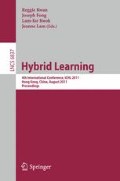Abstract
The purpose of Open Educational Resources movement is to provide open access to high quality digital learning materials, there is broad participation by universities, organizations and volunteers, and has gained a far-reaching influence on higher education. Meanwhile, the growth of Web2.0 has diversified forms as well as channels of learning content and accelerated the openness of this movement, so it is necessary to harness the reusability and quality of open resources. However, current applications and quality improvements are often separated from specific educational contexts. Therefore, it is a pressing task to carry practices around open educational resources, especially pay more attention to the sharing and collaboration in related learning environments, and the opening of pedagogical knowledge and teaching process, as well as learners’ feedbacks and assessments, thus promoting the open educational resources to the open educational practices.
Access this chapter
Tax calculation will be finalised at checkout
Purchases are for personal use only
Preview
Unable to display preview. Download preview PDF.
References
United Nations Educational, Scientific, and Cultural Organization, http://www.unesco.org/education/news_en/080702_free_edu_ress.shtml
D’antoni, S., Savage, C.: Open Educational Resources. The United Nations Educational, Scientific and Cultural Organization 30 (2009)
Nguyen, T.: Science Commons: Open Doors and Open Minds: What Faculty Authors Can Do to Ensure Access to Their Work through Their Institution. SPARC and Science Commons 1 (2008)
ClickZ Network, http://www.clickz.com/showPage.html?page=3625146
Apple iTunes University, http://www.apple.com/education/itunes-u/what-is.html
Enhancing Education, http://ccnmtl.columbia.edu/enhanced/primers/media_channels_open_educational_resources.html
Feiler, J.: How to Do Everything with Web2.0 Mashups. The McGraw-Hill Companies, New York (2008)
OpenContent, http://opencontent.org/blog/archives/355
Wiley, D.A.: The Instructional Use of Learning Objects. Association for Instructional Technology and the Association for Educational Communications and Technology, Bloomington (2002)
Connexions, http://cnx.org/aboutus/overview/content_type
Antoniou, G., van Harmelen, F.: A Semantic Web Primer, 2nd edn. The MIT press, London (2008)
Organization for Economic Co-operation and Development: Giving Knowledge for Free: The Emergence of Open Educational Resources, 76. OECD Publishing (2007)
Iiyoshi, T., Vijay Kumar, M.S.: Opening Up Education: The Collective Advancement of Education through Open Technology, Open Content, and Open Knowledge. The MIT Press, London (2008)
Rice University, http://www.media.rice.edu/media/NewsBot.asp?MODE=VIEW&ID=15110
International Council for Open and Distance Education, http://www.icde.org/filestore/Resources/OPAL/Openeducationalpractice-approachingadefinitionforanewconcept.pdf
Geser, G.: Salzburg Research: Open educational practices and resources: OLCOS Roadmap 2012. Open eLearning Content Observatory Services 12 (2007)
The Cape Town Open Education Declaration, http://www.capetowndeclaration.org/read-the-declaration
Hodgkinson-Williams, C., Gray, E.: Degrees of Openness: The Emergence of Open Educational Resources at the University of Cape Town. International Journal of Education and Development using Information and Communication Technology 75 (2009)
E-learning innovation: research, evaluation, practice and policy, http://e4innovation.com/?p=373
Open Educational Quality Initiative, http://oer-quality.org/
Commission on Behavioral and Social Sciences and Education National Research Council: How People Learn: Brain, Mind, Experience, and School. National Academy Press, Washington (2003)
Lave, J., Wenger, E.: Situated Learning: Legitimate peripheral participation. Cambridge University Press, Cambridge (1991)
Harley, D., Henke, J., Lawrence, S.: Use and Users of Digital Resources. Center for Studies in Higher Education, Berkeley (2006)
Carey, T., Hanley, G.L.: Extending the Impact of Open Educational Resources through Alignment with Pedagogical Content Knowledge and Institutional Strategy: Lessons Learned from the MERLOT Community Experience. pp. 183–186. The MIT Press, Cambridge (2008)
Zhiting, Z., Ping, Y.: Research and Analysis on Typical OER Projects. E-education Research 71 (2009)
The Committee for Economic Development Digital Connections Council: Harnessing Openness to Improve Research, Teaching and Learning in Higher Education. Committee for Economic Development, Washington (2009)
Open Learning Network, http://olnet.org/node/112
Author information
Authors and Affiliations
Editor information
Editors and Affiliations
Rights and permissions
Copyright information
© 2011 Springer-Verlag Berlin Heidelberg
About this paper
Cite this paper
Yin, Y., Fan, L. (2011). Trends of Open Educational Resources in Higher Education. In: Kwan, R., Fong, J., Kwok, Lf., Lam, J. (eds) Hybrid Learning. ICHL 2011. Lecture Notes in Computer Science, vol 6837. Springer, Berlin, Heidelberg. https://doi.org/10.1007/978-3-642-22763-9_14
Download citation
DOI: https://doi.org/10.1007/978-3-642-22763-9_14
Publisher Name: Springer, Berlin, Heidelberg
Print ISBN: 978-3-642-22762-2
Online ISBN: 978-3-642-22763-9
eBook Packages: Computer ScienceComputer Science (R0)

